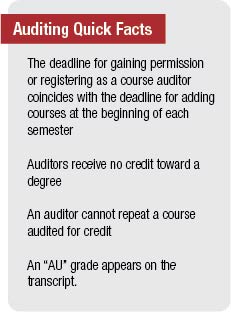Some students enjoy learning so much so that they will choose to sit in on a class for an entire semester without receiving any course credit. The process of sitting in on a class as an inactive participant is known as auditing.
A student must gain prior approval from the department offering the course in order to audit the course. The department then works with the college’s student services office, which will submit a request to the Office of the University Registrar to add the course to the student’s schedule as an auditor. The deadline for gaining permission or registering as a course auditor coincides with the deadline for adding courses at the beginning of each semester.
An auditor is typically considered a passive learner and may not be required to recite in class or take examinations, but the student is expected to attend classes with reasonable regularity and do some assigned work. Ultimately, an auditor needs to check with the instructor regarding his or her expectations.
Auditors receive no credit toward a degree, and an “AU” grade appears on the transcript. The credit received when auditing a course does not count toward verification of full, half or less than half time enrollment status. This credit is not reported to the National Student Clearinghouse for enrollment verifications.
Professors typically hold auditing students to the same standards as those enrolled for credit and might not even know that the student is auditing until time to report midterm or final grades.
Kevin Plfum, a business college professor, said his Honors Principals of Microeconomics class has been audited before.
“I do not have problem with [auditing a class],” he said. “They have their reason for auditing, they do not want it showing on the transcript, and they want to learn materials.”
Pflum said he thinks it is beneficial if a student wants to gain more knowledge. However, if the class is completely full, he said he prefers the students to be all enrolled students.
Though most auditors are motivated and enthusiastic, when the difficulty of the course increases, some auditors may lose their interest and drop the class in the end. Students may audit only one course per semester while paying the standard fee for the course, audited courses do not count toward degree requirements, and an auditor cannot repeat a course audited for credit.
“Auditing is purely an individual decision based on the student’s personal/academic schedule, financial circumstances, life and academic goals, et cetera,” registrar Michael George said.







